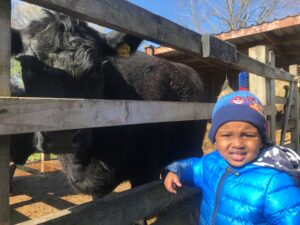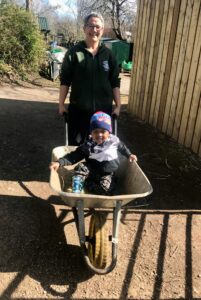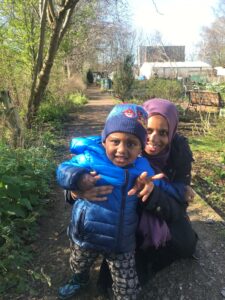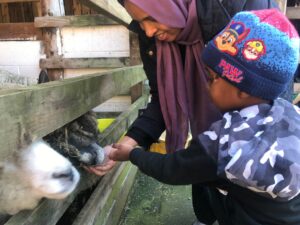Windmill Hill City Farm: Community fun on the farm
Located in an urban area just south of central Bristol, Windmill Hill City Farm is a 4.5-acre green haven with farm animals and gardens that aims to improve the lives of local people through spending time in nature.
The Farm provides a health and social care programme to support the wellbeing needs of older people and those with mental health issues and learning difficulties, and it also offers school visits and nursery provision, courses and training, and volunteering opportunities to local families to encourage engagement within the community.
Research shows that connecting with nature can improve mental health and wellbeing, whilst outdoor play activities are an essential part of healthy child development, assisting in the building of language skills which can contribute to achievement in school and future life opportunities.
When the Covid pandemic struck and many social gatherings and community events were postponed or cancelled, Windmill Hill City Farm made the most of its outdoor space to welcome young families who may have felt isolated from their usual support networks and groups. The participants all lived within walking distance of the Farm and many lived in high-rise flats with limited access to safe outdoor space. Through collaborating with its partners, the Farm also reached out to people for whom integrating into the local community can prove difficult. These included people living in poverty, in care, people from ethnic minorities and families recently arrived from outside the UK who have English as an additional language.
In June 2021, the Farm requested funding of £4,680 from SMV to build on the success of its ‘Little Roots’ project, weekly stay-and-play sessions which promote the benefits of nature for families with new-born babies or toddlers. The grant funded a 24-week programme of outdoor sessions for ten families from the BAME community, which incorporated a nature or gardening activity for parents with their children, followed by an introduction to the farm animals and a healthy snack using fresh farm produce. The sessions were a catalyst for the families to build relationships with others in a similar situation, sharing stories and supporting each other with the challenges of early parenthood.
Not only were the families building connections with each other, they were also learning about the Farm’s animals and produce; developing gardening skills and growing vegetables that they then took home. The Farm believes that engaging with young families through sessions like this is an important initial step in developing a local link which will continue as the children grow, so that the families access the space independently in the future.
Word has been spreading amongst local residents about this welcoming and inclusive city-centre space and the Farm is now seeing an increase in the number of visitors. Through its popular engagement programmes the Farm continues to deliver activities to build cohesion within the community.
Jamal and Amira’s story




Jamal and his mother Amira* have been visiting Windmill Hill City Farm as part of the Little Roots project. They enjoy coming to the farm – it gives them an opportunity to explore the environment, nature and animals and it’s close to where they live. At home their outdoor space is overlooked, shared, noisy and polluted from the nearby traffic, so the Farm is a green oasis for the family. Jamal, aged 2, loves the Farm and experiences a sense of belonging here. When Amira tells him they are going to the Farm, he shows great excitement in coming, and can name some of the animals and make the animal noises. He is delighted to see the Little Roots team and when he arrives shouts “Hi, hi!”.
Jamal’s confidence with the animals has really grown over the time he has been coming and he enjoys feeding the cows and the sheep. He loves seeing the goats being released into the paddock and his language is improving as he learns the names of the farm animals.
Amira has a fondness for nature and the outdoors and enjoys coming to the Farm for planned sessions, and at other times too. She says she feels very welcome at the Farm with the friendly staff and people. It’s an important social place for Amira to come and feel connected to others, and she is learning more about nature, animals and the outdoors.
* Names changed to protect identities
